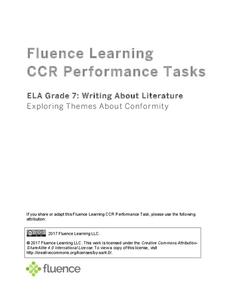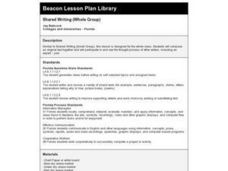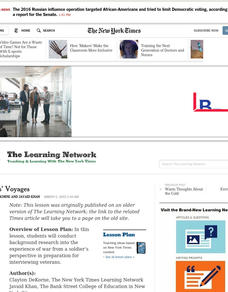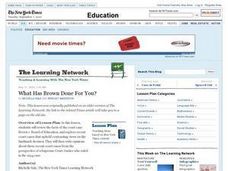Fluence Learning
Writing About Informational Text: Beyond the Beyond—Galaxies
Everyone has a different point of view, even when it comes to the enormity of the universe. Two separate text passages explain the scope of a galaxy, prompting young readers to write an essay about each author's argument and how the...
EngageNY
Revising for Organization and Style: Bold Beginnings
Get young writers thinking about how to write a great beginning for their narratives. After examining examples of solid beginnings in literary text, young writers discuss the criteria for a compelling introduction. Then, independently,...
EngageNY
Revising for Organization and Style: Exciting Endings
Young writers compose a gripping ending to their historical fiction narratives. Following the previous lesson plan, where learners wrote a bold beginning, class members examine exciting endings from a literary text. They then draft their...
Teachers.net
How to Write a Movie Review from a Pet's Perspective
When would two paws up denote a blockbuster film in your classroom? Only when young writers create movie reviews from a pet's perspective in this imaginative expository writing practice. This engaging topic begins with a class discussion...
EngageNY
Preparing to Write Historical Fiction: Determining Characteristics of the Genre
A language arts instructional activity helps young writers identify elements that make up historical fiction. First, it guides them through elements of fictional pieces with vocabulary cards. Then, pupils work collaboratively to...
Curated OER
Altering Text Size, Color, and Font
Students explore computer text. In this word processing and computer lesson, students practice changing color, font, and the size of their text with guided instruction from the teacher.
Curated OER
Main Idea in Informational Text
Readers identify main ideas and supporting details using informational texts. For this literacy lesson, they make predictions and read the text to find the main ideas. They use a table diagram to define the main idea and supporting...
Fluence Learning
Writing About Literature: Exploring Themes About Conformity
Feeling the pressure to confirm is something any adolescent can relate to. Explore an essential theme with a response to literature assessment that prompts learners to identify main ideas with evidence and supporting details.
Curated OER
Knowing Write from Wrong
Explore how the informality of electronic correspondence has affected communications in the workplace. Writers develop pages for a basic writing guide that contains rules and examples to help correct common writing errors. A great way to...
Curated OER
Writing a Summary
Skim, reread, and then take notes. The step-by-step procedure outlined in this resource can be used to help pupils write a summary of a reading passage. Using their notes, class members then draft a summary focusing on the main idea and...
Curated OER
Synonyms and Antonyms
Mix up your writing lessons by having kids look at recent newspaper articles instead of their own work. They work in pairs and rewrite sports news articles using synonyms and antonyms for a set number of words. Then they share their work...
Curated OER
Only the Facts
Practice the strategy of summarizing to gain meaning and knowledge from an informational text. Young readers highlight supporting details and main ideas, and then they use this to summarize two articles: "The Great Quake" and "What...
Curated OER
Playing Vocabulary Basketball
Learners view a slide show featuring famous athletes and educational institutions that have played a part in the history of basketball. They participate in a game in which a basketball is tossed from person to person as facts and...
Core Knowledge Foundation
Unit 4: The Renaissance
The Renaissance is the theme of a five-week unit designed to boost reading comprehension, spelling, vocabulary, and expository writing skills. Scholars listen to and discuss daily readings and engage in skills practice activities...
Curated OER
How To Write a Social Studies Outline
One of the keys to success in school is organization. This resource leads learners through the process of creating an outline for a chapter from a social studies text. In addition, they review facts they have learned in their class...
Curated OER
Writing a Storybook
Students explore language arts by creating their own stories in class. In this book making activity, students read the story City Pig in class and create storyboard illustrations in order to analyze the story. Students utilize these...
Curated OER
Shared Writing (Whole Group)
Students participate in a whole class shared writing activity. They create an original text while examining the thought process of writers.
Curated OER
Sentence Revision
High schoolers review the procedures for revising sentences. After viewing a PowerPoint presentation, they read a handout of common wordy phrases and discover how to jazz up their writing. They complete a worksheet in which they revise...
Curated OER
How To: Friendly Letter Writing
Second graders investigate the proper mechanics of a letter by writing to fictional characters. In this friendly letter instructional activity, 2nd graders read the book Stars in the Darkness, analyzing the story and characters with...
Curated OER
Veterans' Voyages
Introduce your middle and high schoolers to a different perspective on war: that of soldier's. Read Guisseppi Ungaretti's poem "Vigil" to kick-start this instructional activity. After discussing his perspective, read "The Screaming...
Curated OER
What Has Brown Done for You?
Learners review the facts of the court case Brown v. Board of Education. Next, they research recent court cases that uphold contrasting views on the landmark decision. They write opinions about these recent court cases from a 1954...
EngageNY
Reviewing Conventions and Editing Peers’ Work
Encourage young writers to edit text based on conventions. After reviewing the conventions, fourth graders watch a teacher demonstrate how to revise a paragraph for correct spelling, capitalization, punctuation, or dialogue. Then, pairs...
Houghton Mifflin Harcourt
Nature: Friend and Foe: Extra Support Lessons (Theme 6)
Breaking down words into syllables has two benefits: it improves vocabulary and it improves understanding of a text. The third and final resource in a series of materials designed to be used with Nature: Friend or Foe offers extra...
National Museum of the American Indian
The A:Shiwi (Zuni) People: A Study in Environment, Adaptation, and Agricultural Practices
Discover the connection of native peoples to their natural world, including cultural and agricultural practices, by studying the Zuni people of the American Southwest. This lesson includes examining a poster's photographs, reading...























